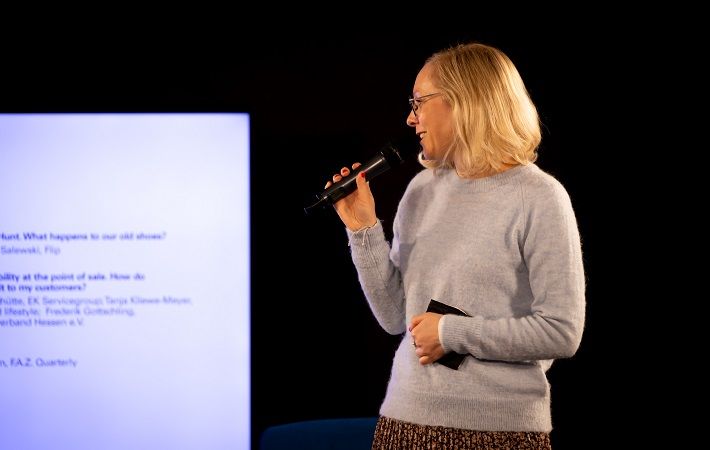Bettina Bär, show director of Neonyt Pic: Neonyt | Fashionsustain City Edition | Dita Vollmond
Under the motto ‘Change the set-up’, Fashionsustain – the international and multidisciplinary conference format of Neonyt, which took place in hybrid format on January 19, 2022 as part of Frankfurt Fashion Week – showed how the textile and fashion industry can face the ongoing transformation process head-on and prepare itself for future challenges.
The spotlight was on the topics of consumer behaviour, due diligence obligations from a company perspective and sustainability at the point of sale, the fair organiser said in a press release.
“Just how agile we all need to be these days was more than apparent in the dynamic situation we faced during the preparations for this current edition of Fashionsustain,” says Bettina Bär, show director of Neonyt. “Constantly having to adapt to new circumstances will also be a key skill of our industry in the future. Inspiration as to how that can be achieved was provided at our international and multidisciplinary conference format by the speakers and their fascinating insights into their specialist subjects.”
Under the motto ‘Change the set-up’, Fashionsustain – the international and multidisciplinary conference format of Neonyt, which took place in hybrid format on January 19, 2022 as part of Frankfurt Fashion Week – showed how the textile and fashion industry can face the ongoing transformation process head-on and prepare itself for future challenges.
Starting the conference at the hybrid City Edition at Danzig am Platz was neuroscientist professor Maren Urner, with her keynote speech titled Change the Mindset. The focus was on the attitude-behaviour gap and how we can overcome it. Urner advised having a positive mindset and quoted American psychotherapist Steve de Shazer, “Talking about problems creates problems. Talking about solutions creates solutions.”
In the subsequent deep dive with Karin Ziegler from Blutsgeschwister and Lutz Dietzold from the German Design Council, she reflected on why people act differently than they intend to and how our own attitude, and therefore the attitude of the entire industry, can reflect our behaviour even more in the future. “We need both: an individual change and a systemic one. But the systemic change can only succeed if we all make a start individually. Because, at the end of the day, the system is made up of us as people,” explained Urner.
“Many companies are reporting that measures like the UN key principles are helping them to position themselves sustainably – when it comes to risk analysis and monitoring, for example,” said Christine Moser-Priewich from the Green Button in the certification’s own panel discussion on due diligence obligations from a company perspective.
“Consumers who want to be sustainable don’t have it easy right now,” said Christian Salewski from research start-up Flip. “They are often unable to tell the difference between green marketing campaigns and honest intentions.” In his Insight Talk, he explained how Flip is supporting consumers to navigate their way around the often ambiguous sustainability market on their mission to ensure more transparency. As an example, he gave the audience a glimpse behind the scenes of Sneakerjagd, one of the industry’s most hotly discussed videos last year, in which Flip – together with NDR, Die Zeit and well-known celebrities – exposed the truth behind sneaker recycling and showed that they aren’t always recycled how the brands say they are. “From politicians and consumer protection groups, we have received the feedback that our research was an important boost to jump-starting the circular economy legislation.”
The Fashionsustain City Edition was rounded off with a panel discussion about sustainability at the point of sale. Tanja Kliewe-Meyer from Like a Bird, Marco Schütte from the EK Service Group and Frederik Gottschling from the Handelsverband Hessen, the trade association for the state of Hesse, discussed how the retail sector can contribute to raising awareness among consumers and what that could mean for the rejuvenation of city centres. “It is important to create worlds of experience that bring sustainability to the cities. The times of mono-stores that make every city centre look the same are over,” Tanja Kliewe-Meyer said.
Fibre2Fashion News Desk (RR)


:max_bytes(150000):strip_icc()/Health-GettyImages-1342980570-80531d9053c343799c89a6dbe9fcb768.jpg)


